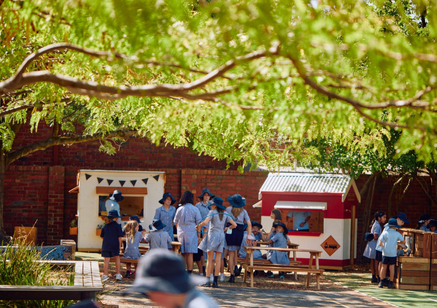As the new school year approaches, many families are preparing for the transition from kindergarten to primary school. As parents of two boys aged 11 and 9, who are starting grades 6 and 3 respectively, we understand the importance of this major milestone in a child's life.
Our own journey as parents, combined with our experience in the childcare, kindergarten, and primary school industries, has given us a wealth of knowledge about transitions. We have also taken a keen interest in the major studies on transitions from kindergarten to primary school in Australia. There is some valuable research on what successful transitions should look like and we want to share our learnings and experiences with you.
In this post, we will explore what a successful transition looks like, why a successful transition to school is crucial for later academic success, and what schools are doing to ensure successful transitions from kindergarten to primary school.
Image: Me and my eldest Jethro on our 1st day of BIG school!
What defines a successful transition from Kindergarten to Primary School?
A successful transition from kindergarten to primary school is a smooth and positive move from the familiar and nurturing environment of early childhood education to the more structured and academically focused environment of primary school.
Your child should feel well-prepared and excited to start primary school, and the parents should feel confident and informed about the transition.
Why is a successful transition from Kindergarten (or prep) to Primary School so important?
Studies have been conducted globally and locally by institutions such as Victorian University to investigate the relationship between having a positive start to school and later academic success.
The research on the correlation between school readiness and positive life outcomes has also played a crucial role in the development of the $9 Billion Free 3 Year Old Kindergarten program, which aims to provide an extra year of play-based learning to help children acquire the skills necessary for confidence, social and emotional development. We wrote a blog article on the VIC Free 3 Year Old Kinder Program you can read HERE.
What impact does a positive start to school have on a child?
When a child moves from the familiar environment of early education to big school, if they feel secure, supported and safe in the school environment, they are more likely to develop independence, resilience, and a sense of agency, which leads to a more positive attitude towards learning. This was supported by a study by Dockett, S. and B. Perry (2007) at the University of NSW, which established that a smooth transition to school is associated with better academic and social outcomes.
So it’s not how far they can run or jump, but how well your child can play and imagine.
This research project revealed an interesting finding that among the primary school teachers who participated, only one emphasised the significance of skill development such as fine motor development, while the others believed that a positive start to school focuses more on social and emotional development rather than skill acquisition and knowledge. Learning dispositions such as curiosity, persistence, willingness to try, and resilience were highly regarded by both primary school teachers and early childhood professionals.
Image: Our youngest Shepard on his 1st day of primary school.
What are Primary Schools currently doing to ensure a successful transition?
Children have opportunities to visit their new schools though orientation days to meet their new teacher and classmates and on arrival typically a buddy system is in place with Grade 5 and 6 students. We LOVE the buddy system, both our boys have been involved in these both on receiving a buddy and our eldest has now been a buddy. It really does work! Orientation days before schools start and an easing into the year are all programs to reduce stress and anxiety in the first instance.
Play-based learning opportunities: Schools have been for some time recognising the importance of play-based learning as a tool for developing social, emotional and cognitive outcomes, especially in the foundation and year 1-2 classes. We have seen first hand the wonderful opportunities kids have had in the classrooms to engage them on this level and we congratulate schools on paying close attention to the studies into play-based learning and giving it the air time it deserves.
So what can we as a parent do to support our child’s transition to school?
Really the message here is PLAY! The more play, socialistion and imagination your children can have in the years before they start school the better prepared they are for life!
How Castle & Cubby are working with Primary Schools to ensure a successful foundation year?
We have been working with some wonderful and progressive schools who are really recognising the power of play-based learning not only in the classroom but also in the school yard. They understand the importance of the positive start to school experience and the correlation to later academic success.
They are also noticing that in the playground the foundation year kids have probably been a little left out of the fun. Typical primary school playgrounds with their BIG jungle gyms and their BIG ovals and sporting equipment are pretty overwhelming and if not out of bounds for most foundation years kids, some of whom are just 4 years old when they start.
We have been developing alongside primary school educators products and spaces that encourage imaginative play and deliver social, emotional and cognitive development opportunities specifically for foundation - grade 3 kids. These spaces compliment the work being done by schools to ensure a wonderful transition experience and support positive transition to school outcomes.
If you think your kids could benefit from enhanced play-based learning spaces that support their transition to school please let your school know.
We work with school Australia-wide to deliver social, emotional and cogntive outcomes through imagination play.
View Our Education Catalogue HERE.

